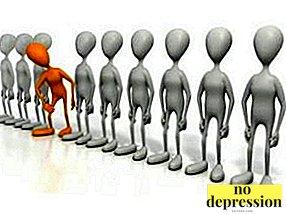Each person has certain individual traits.
Social and psychological personality characteristics are important subject of scientific study.
Concept

Person cannot exist outside of society.
This is its main difference from animals.
Social personality - it is any individual who belongs to public groups, enters into public relations, is an independent member of society with certain rights and duties.
Each person has many social personalities, since his life in society is usually sufficient multilateral. One and the same person can be perceived by different people from their environment differently from a social point of view.
For example, the social personality that colleagues see may not have anything to do with the familiar personality to friends or relatives.
Socio-psychological side of any person includes a set of specific individual parameters. Each person is an individual, with his own set of social and psychological traits.
The formation of a socio-psychological portrait of an individual is influenced by many factors: anatomical features, properties of the psyche, the immediate environment, social groups, education, the sphere of professional activity, ideology, religion, etc.
Each person is originally a "clear sheet"which, in the process of socialization under the influence of the above factors, begins to form into a specific personality with its own individual set of psychological and social traits.
Types

In modern science, it is customary to single out the following social types of personality from the point of view of the value orientations inherent in individuals:
- Traditionalists. For them, law-abiding, diligence, discipline and responsibility come first. Similar features are observed against the background of the lack of desire for self-realization, independence.
- Idealists. They are the exact opposite of traditionalists. They strive to express themselves and act in accordance with their own attitudes and principles. Do not recognize the authorities and the traditional views on questions.
- Frustrated type. These people do not feel involved in public life, in making important public decisions. They are characterized by low self-esteem, a constant state of depression and passivity.
- Realists. Such individuals competently combine the desire for self-realization with an awareness of a sense of duty.
They are able to rationally address problems and objectively evaluate the proposed circumstances.
- Hedonistic materialists. They are typical consumers who seek to receive momentary pleasures without thinking about tomorrow. Their own desires are always in the first place.
Personality types:
Socio-psychological portrait

Each person has a bright personality, consisting of natural, social, psychological characteristics.
Socio-psychological portrait any individual can be based on the analysis of the following components:
- temperament;
- character;
- skills;
- level of intelligence;
- emotionality;
- volitional qualities;
- sociability;
- self-esteem level;
- degree of self-control.
In the process of socialization of a person in society, these components are constantly changing and developing. It happens as a result of learning social experience, obtaining new ideas about the surrounding reality, acquiring knowledge, mastering behavioral patterns, etc.
For this reason, the socio-psychological portrait of a person is formed throughout life.
Properties and qualities

Socio-psychological properties - these are stable, individual features of a specific individual, which allow characterizing him from a social and psychological point of view.
These properties are divided into four groups:
- properties, associated with the development and application of social abilities (intellectual level, imagination, networking, etc.);
- properties, formed under the influence of the group and as a result of intra-group interaction (knowledge, skills, behavior patterns, etc.);
- properties, related with social behavior individual position (activity, responsibility, sense of duty, desire for cooperation, etc.);
- properties, based on the psychological characteristics of the individual (open thinking, mental mobility, model of response to critical situations, etc.).
Socio-psychological qualities are personality characteristics that are formed in the process of interaction with other people, during communication.
Depending on their qualities personality can fulfill certain public roles, occupy a specific social position. The standard classification provides for the separation of people into three types in accordance with their inherent qualities:
- Athletics. People with an active lifestyle, who always strive to dominate and control.
- Picnics. People with well-developed adaptive mechanisms that allow them to easily enter into communication and successfully avoid conflict situations.
- Asthenics. Classic introverts who prefer solitude.
Structure
The personality of a person has a certain structure:
- psychological the party is responsible for the functioning of all mental processes;
- social the side reflects the qualities necessary for successful functioning in society;
- worldview a part is responsible for the formation of a system of assessments, views and ideas about the surrounding reality.

Special features
From a socio-psychological point of view The following characteristics are inherent in the personality:
- is not only an object, but also a subject of social relations, since it has the freedom of choice;
- is unique because it has an individual set of social and psychological characteristics;
- formed under the influence of society (the process of socialization);
- aware of his attitude to various events, phenomena, public attitudes;
- aware of their needs, desires and goals;
- committed to self-realization;
- independently forms an opinion about members of the society with whom he enters into various communications;
- fully integrated into the relationship with the surrounding reality;
- engaged in a specific activity that allows to meet material needs and take a certain place in society.
Analysis Parameters
The socio-psychological parameters of personality analysis are as follows:
- Maturity. The highest level of maturity is the presence of certain attitudes and attitudes. A mature person is guided in his actions by an individual value system. He holds a respected position in society and is an object to follow, he does not give up his views even under the threat of violence. Such a person can contribute to the development of other members of society, who take an example from him. An immature person is distinguished by the lack of a clear value system and a low level of social responsibility.
- Adaptation. This is the degree of human adaptation to society. In case of conflict adaptation, non-acceptance of social norms occurs, which leads to psychological stress and difficulties with self-realization. With medium adaptation, a person quite lives into the surrounding reality and more or less successfully functions in society.
With a high level of adaptation, the individual not only adapts to the surrounding reality, but also successfully develops in the proposed conditions.
- Adequacy. This is the adoption and assimilation by man of the norms and principles existing in society. The individual does not just superficially adjust his behavior under the generally accepted models, but internally transforms himself in the process of socialization. Adequate from a social point of view, people are distinguished by a high level of morality and ethics.
- Identity. This is the result of the identity of the person. Realizing his “I”, the individual can match the demands and opportunities offered by society with his abilities and desires. As a result, a mechanism for regulating behavior in society is developed, taking into account ideas about oneself.

Maturity

Social maturity - the ability of a person living in society to take responsibility for making decisions.
A mature person is distinguished by integrity of character, predictability, positive orientation of behavior.
Mature person always clearly aware of his goals and strives to achieve them, while not violating the interests of other members of society. Such people very objectively assess themselves and the people around them, make decisions according to circumstances.
Achieving social maturity does not negate the need for other people. A mature person continues to learn new experiences, revise his views and work on himself throughout his life. But other people for him are advisers and interlocutors, and not teachers and mentors.
The ratio of biological and social
Man is a biological organismwhich appeared as a result of evolution. In each person's body, various natural processes take place, which to some extent determine its behavior.
But from a biological point of view it is impossible to evaluate a person, since he is simultaneously a social being.
how product of society a person goes through a process of socialization, as a result of which the assimilation of certain norms, principles of behavior, rules, attitudes, etc. occurs.
At the same time, during socialization, the individual traits of a particular individual have great importance on the assimilation of all these principles, since all the information transmitted by society is passes through the prism of its own consciousness.
Thus, the information laid at the genetic level distinguishes man from other living organisms and forms his biological nature. And received in the process of socialization of education, education forms the social component.
Theory of Psychosocial Development by E. Erickson

E. Erickson argued that a person develops throughout his life.
From birth to death, he goes through 8 stages, each of which is accompanied by a certain the crisis:
- infancy (0-1 year);
- early childhood (1-3 years);
- childhood (3-6 years);
- school age (6-12 years old);
- adolescence and youth (12-20 years);
- early maturity (20-25 years);
- average age (25-65 years);
- late maturity (after 65 years).
Every crisis can end safely or negatively.
If a person successfully overcomes it, then he moves to the next stage of life with good prerequisites for further personal development.
If the crisis is not overcome, the transition to the next level still happens, but unresolved issues at the new level remain together with the person.
Personality and Environment

All socio-psychological phenomena arise as a result of the interaction between individuals, groups, social environment.
Under the medium is understood the whole range of public relations and phenomenasurrounding a person in his daily life.
The social environment is formed on the basis of economic indicators, class and nationality, household and professional activities
Without a social environment, a person could not become a person. The mere fact of the existence of the human body does not ensure the assimilation of the necessary social skills and behaviors.
For the formation of social traits, a person must live in a social environment and learn the social and historical experience of past generations.
More than once there was scientific evidence that grown out of society children remain at the level of animal development.
They do not have a conscious mind, imagination, do not know how to speak. Only by participating in social activities, entering into social contacts, performing work duties, can a person become a full-fledged person.
So, social personality formed by any person living in society. This personality has certain characteristics, properties and qualities.



